How to Free up Space on PC: 7 Effective Methods
 165
165
 0
0
You may need to free up storage space on your PC if your disk is nearly full or if you want to install a large game like Fortnite. In this article, I will share seven ways that I've found to free up space on a Windows computer.
 Cisdem Duplicate Finder
Cisdem Duplicate Finder
Easily Reclaim Space Occupied by Duplicate Files
- Find duplicate photos, videos, documents, audio files, and all others
- Support Windows PC, Mac, external storage devices, and cloud drives
- Find duplicate files in folders, iTunes, Apple Music, and more
- Offer 3 modes to view duplicates, along with side-by-side photo previews
- Automatically select all but one file for deletion in each set of duplicates, enabling you to eliminate all duplicate at once
- Allow you to easily adjust selections based on your needs
- Help you quickly free up space taken by unnecessary duplicates
- Easy to use for everyone
Method 1. Quickly free up space by emptying the Recycle Bin on your PC
When you click Delete to remove an unwanted file, the file will be sent to the Recycle Bin but still takes space on your hard drive. Emptying the Recycle Bin is one of the quickest and easiest way to regain some space.
Note
Do this only if you are sure you no longer need the files in the Recycle Bin. Once files are deleted from there, you can't get them back unless you use powerful file recovery software (which can't guarantee a complete recovery).
Step 1. On your Desktop, right-click Recycle Bin.
Step 2. Choose Empty Recycle Bin in the menu that appears.
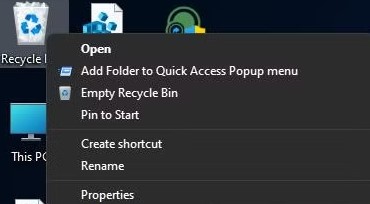
Step 3. Confirm it by clicking Yes.
Tip
If you are confident that you don't need old files in the Recycle Bin but not sure with the recently deleted ones, you can open the Trash Bin, sort files by Data Deleted, select those old files, right-click, and then choose Delete.
Method 2. Free up significant storage space by deleting large files
Large files, for example, movies you've downloaded, can accumulate on your disk over time, taking up a large amount of space. Eliminating them can help you regain lots of space.
You can find and remove them using File Explorer, which, however, can take quite a while. I recommend a free tool called Everything. I've been using this tool for more than ten years and find it very efficient.
Step 1. Download and install Everything. Open it.
Step 2. From the Search menu, choose a file type, such as Video.
Tip
I recommend starting with videos or compressed files, since they are often larger in size.
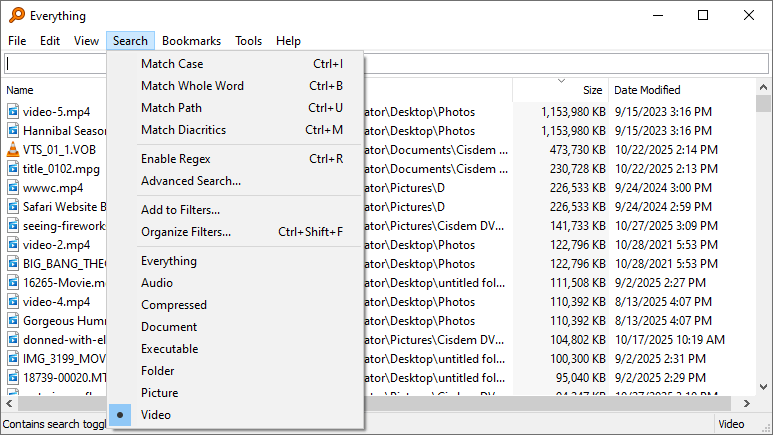
Step 3. The tool will immediately list all files of your chosen type. Now, sort them by Size.
Step 4. Select one or multiple large files, right-click, and then choose Delete. They will be moved to the Recycle Bin.
(To view a large file in File Explorer or an associated app, just right-click and choose Open Path or Open.)
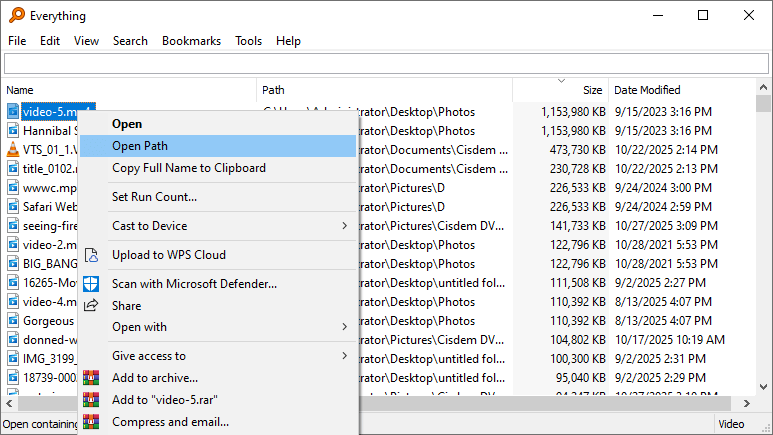
You can repeat steps 2 to 4 to manage other types of large files.
Note
In step 2, you can choose the Everything option (instead of a specific file type) to list all large files on your disk. However, I personally don't recommend doing so unless you are sure of what you are doing. (For example, mistakingly deleting a system file may cause your computer to malfunction.)
Method 3. Free up storage space by cleaning up duplicate files
Double files (aka duplicate files) inevitably accumulate during usage of the computer, which can take up a lot of space. Cleaning up duplicate files can help you free up space effectively.
Cisdem Duplicate Finder (a professional and easy-to-use duplicate finder for Windows PC) can scan your computer and quickly finds duplicate files, e.g., duplicate photos, documents, and videos.
Step 1. Download and install Cisdem Duplicate Finder on your Windows 10/Windows 11.
 Free Download Windows 10 or later
Free Download Windows 10 or later
Step 2. Open it. Click the plus icon. Add one or multiple drives/folders on computer that you want to free up space on, such as D drive.
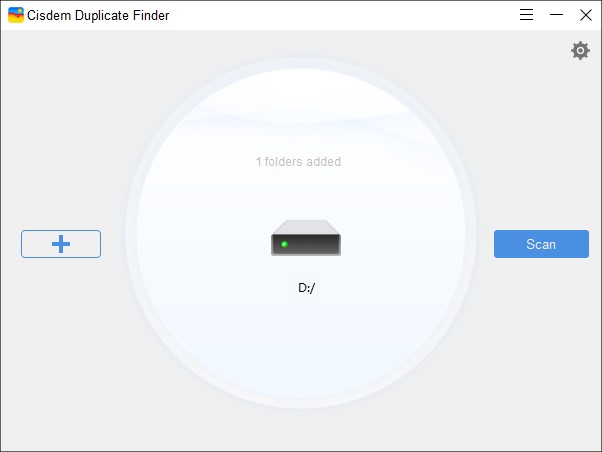
Step 3. Click Scan.
Step 4. It will quickly display the scan results and show the duplicate files found on your computer by type. View the duplicates that take up your computer space.
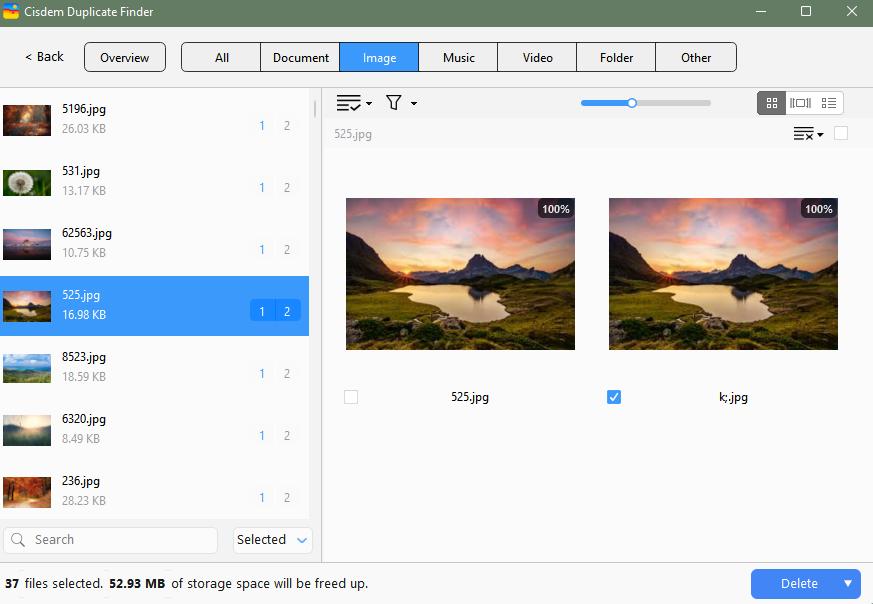
Step 5. This tool has already automatically select all but one file for deletion in each set of duplicate files. You can click the Delete button in the bottom right corner to remove them directly.
It also offers 8 rules to help you mass select duplicates, like Select oldest, Select low-quality, etc.
Or, you can select unwanted files to remove one by one manually.
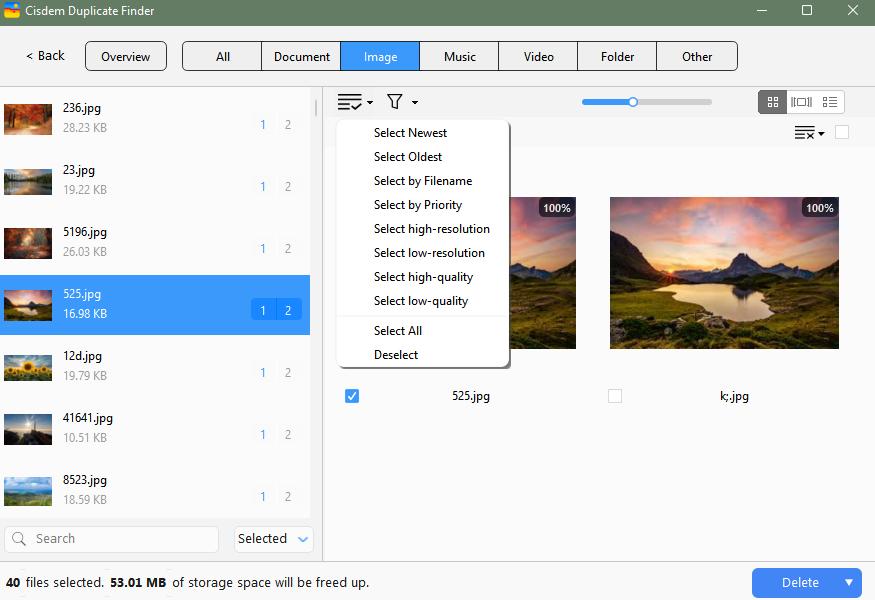
Step 6. After checking the selected duplicate files, click Delete to remove them to the Recycle Bin on your Windows PC.
Method 4. Free up space by cleaning up junk files on Windows computer
Junk files are not useful to you. They are temporary files that can be caused by your computer or the apps you installed and a few other possible things. If you haven't paid attention to them for a long time, you will find that they will take a lot of storage space on your computer.
To free up windows hard drive space storage by cleaning up junk files, you can choose from two tools.
Use the built-in Disk Cleanup tool
Step 1. Open File Explorer and right-click the disk you want to free up space (such as C drive).
Step 2. Select Properties > Disk Cleanup.
Step 3. Check the file types to be cleaned, such as Download Program Files, Temporary Internet Files, etc.
Step 4. Click OK.
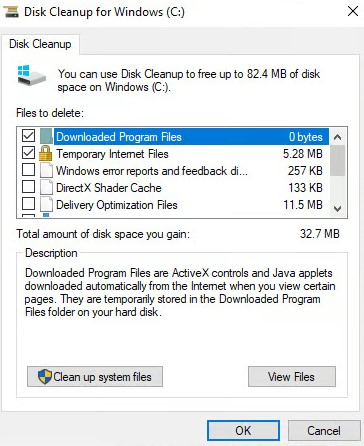
Use Microsoft PC Manager
Step 1. Install Microsoft PC Manager from the Microsoft Store. Open it.
Step 2. Click Deep cleanup in the lower left part.
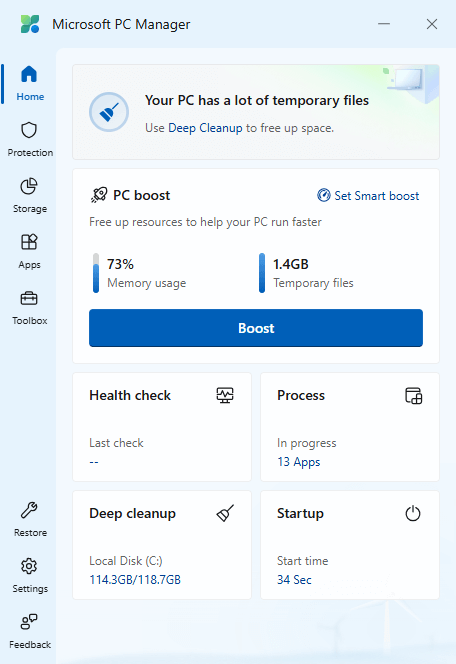
Step 3. When it finishes scanning for junk files, go through each type of junk files (for example, log files and caches) and select the files you want to delete.
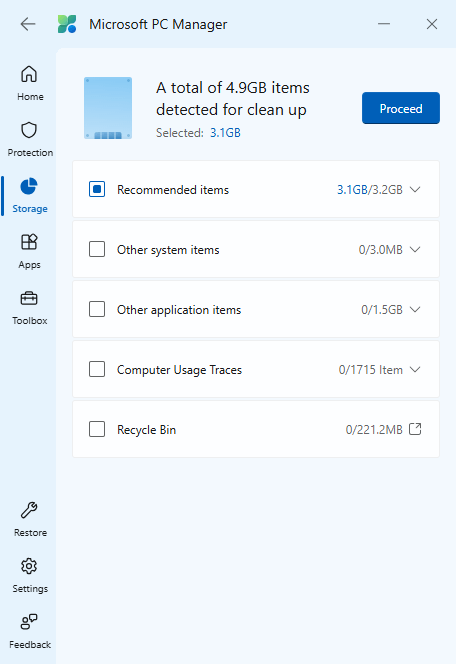
Method 5. Free up disk space on Windows PC by deleting useless applications
One of the main reasons for insufficient computer hard drive space is the accumulation of a large number of useless applications, especially some large games, or some pre-installed applications. They take up a lot of storage space on your computer but useless. By viewing the size of the application and the frequency of use, you can quickly identify unnecessary applications that should be deleted.
To delete unused apps on Windows PC and free up disk space:
Step 1. Open your computer. Click the Start menu. Select Settings. Or press Win + I on the keyboard.
Step 2. Click Apps > Installed Apps to view a list of all installed apps on your PC.
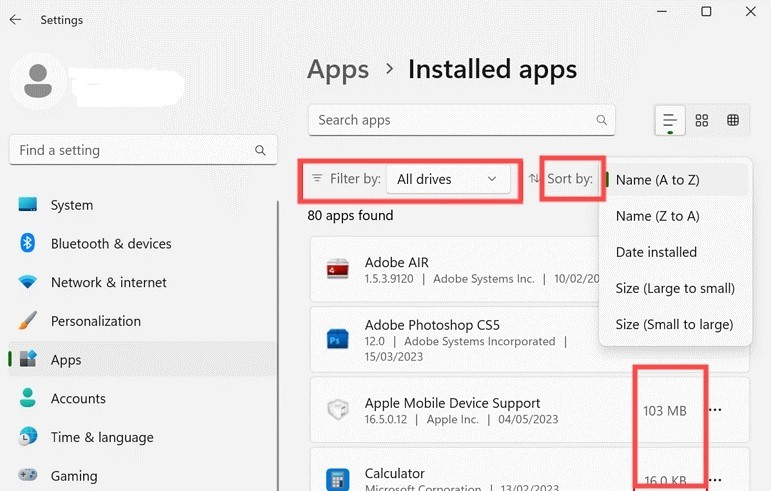
Step 3. Sort apps by Size. Find the apps that take up a lot of space or have not been used for a long time.
Step 4. Click the 3-dot icon next to the unwanted app.
Step 5. Click Uninstall to remove it from your computer.
Method 6. Free up windows hard drive space storage by moving files to an external hard drive/cloud drive
Moving infrequently used files to an external hard drive or cloud drive is also an effective way to free up windows hard drive space storage. Using external hard drives is a more affordable option. But they need to be properly kept to prevent loss or damage. In contrast, cloud drives such as OneDrive, Google Drive, and Dropbox are usually more expensive, but are more convenient for accessing files anytime, anywhere.
Not all files on computer can be moved to an external hard drive or cloud drive. It’s recommended moving only old videos, photos, and backup files.
Move files to an external hard drive
Step 1. Connect the external hard drive to your computer.
Step 2. Open the File Explorer. Find the files or folders that you wish to move.
Step 3. Right-click them and select Cut.
Step 4. Double-click your external hard drive's name to open it.
Step 5. Press Ctrl + V to paste them.
Move files from computer hard drive to a cloud drive
Step 1. Log in to your cloud storage account.
Step 2. Open the File Explorer. Select the files or folders that you want to move.
Step 3. Drag and drop them into your cloud drive folder.

After moving files to an external hard drive or cloud drive, you will find that a lot of computer hard drive space is freed up.
Method 7. Automatically free up space with the Storage Sense feature in Windows 10, 11
Storage Sense is a tool. It is with your computer and can help you free up drive space. It can automatically clean up files that are not useful. It can remove temporary files and empty your Recycle Bin. It can also manage files that are not used for a long time by you. Here is how you use it:
Step 1. Open your Windows 10 or Windows 11. Click Start > Settings. Or press Win + I on the keyboard.
Step 2. Select System > Storage.
Step 3. Turn on the toggle switch next to Storage Sense.
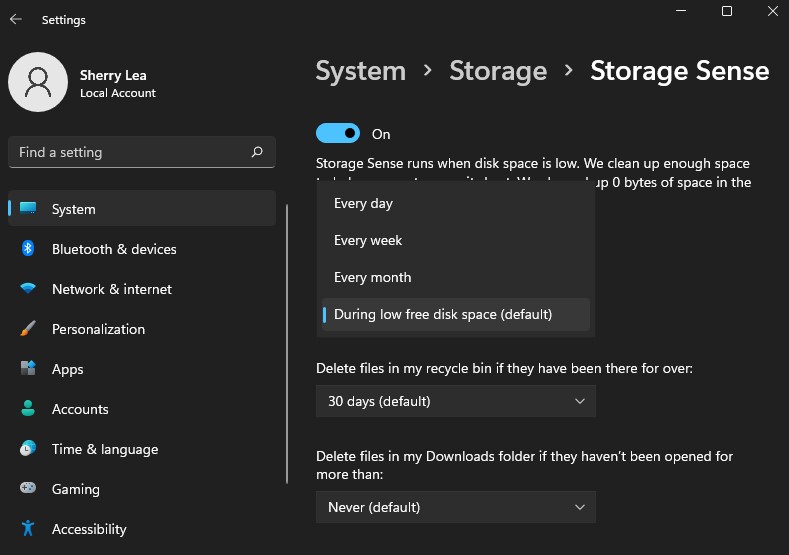
Step 4. By default, Storage Sense runs when disk space is low. You can also set it to run daily, weekly, or monthly.
Step 5. Set how often you want it to delete files in Recycle Bin and files in the Downloads folder, such as 30 days.
Then Storage Sense will automatically run according to the rules and free up disk space for you.
FAQs
How do I free up storage on my PC?
The primary way to free up storage on PC is to delete unnecessary files, such as unwanted large files, duplicates, and redundant apps.
What should I delete when storage is full?
You can start with cleaning up unnecessary personal files, such as watched movie videos and two copies of the same photo. However, you should be cautious with system files. Just leave them as they are unless you are tech-savvy and confident with deleting them.
How do I find out what's taking up space on my computer?
You can check out space usage status in your PC's Storage settings or Microsoft PC Manager. If you are curious the specific files that are using your disk space, you can use tools like SpaceSniffer.

With a passion for tech and writing, Sarah joined Cisdem, where she focuses on creating articles about using utility tools to enhance file management and simplify contact management.

Adrian Li is Cisdem’s Chief Engineer and serves as the editorial advisor for Duplicate Finder and ContactsMate. His work and insights have been featured in leading tech publications such as Fossbytes, TUAW, Redmond Pie, SafetyDetectives, and BestForAndroid.















